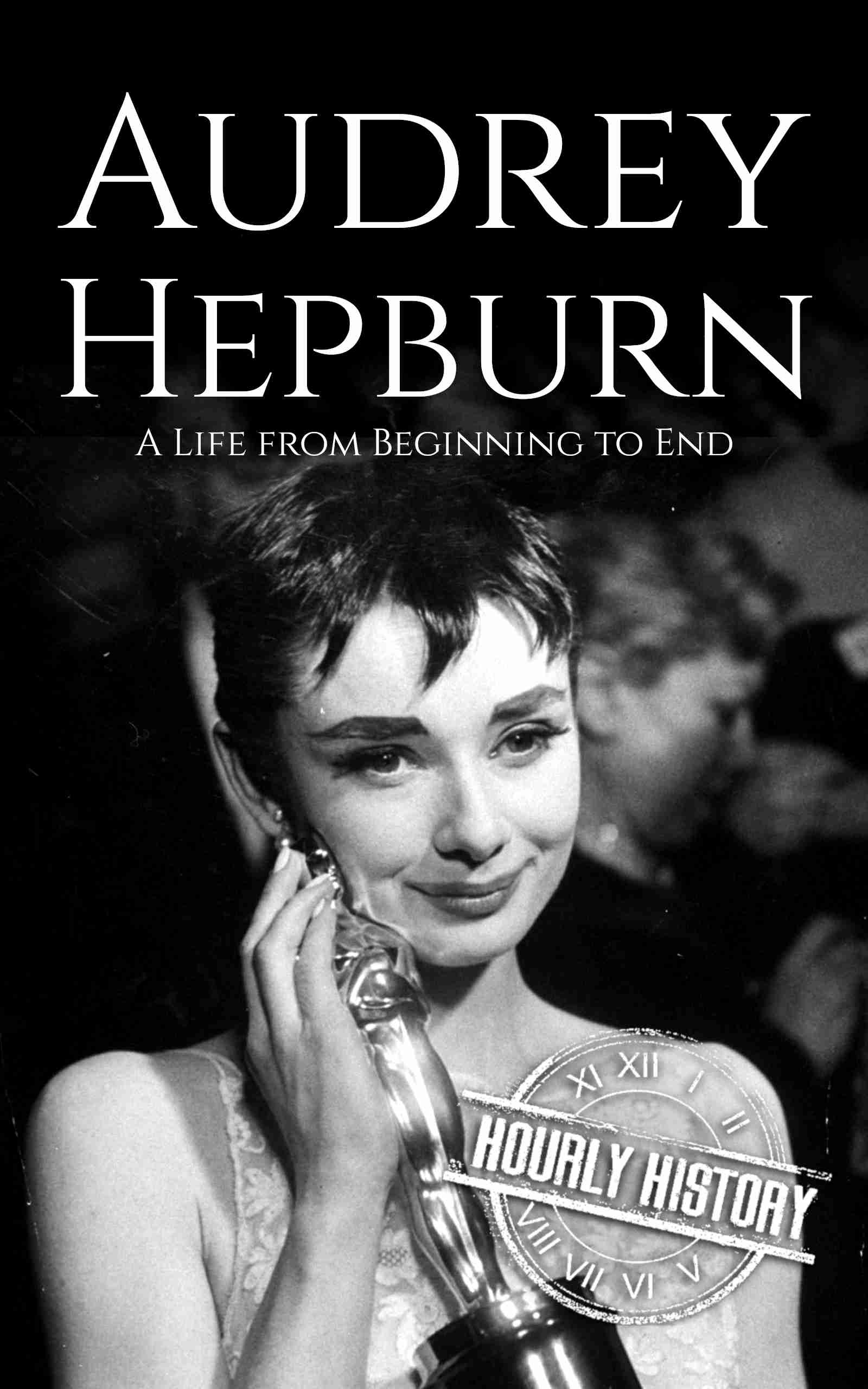Discover the remarkable life of Audrey Hepburn...
Very few lives can be described as fit for a Hollywood film. Audrey Hepburn’s life, however, is undoubtedly one of those few. After a difficult childhood that saw her parents divorce and her young existence shattered by the Nazi invasion of the Netherlands, Audrey Hepburn’s career as an actress knew no bounds. Audiences flocked to see her, and actors yearned to star alongside her. Dressed often exclusively by Givenchy, Audrey was the epitome of chic and elegance.
After divorcing two husbands, Audrey ended up with the love of her life, and when she gave up acting, she became a UNICEF ambassador and created awareness of childhood illness and hunger throughout the world. Audrey Hepburn was the type of woman who made her own dreams come true.
Discover a plethora of topics such as
- Born into War
- Debuting in Broadway and Hollywood
- Rise to Super Stardom
- Losing Her Child
- Breakfast at Tiffany’s
- Late Life and Work for UNICEF
- And much more!
So if you want a concise and informative book on Audrey Hepburn, simply scroll up and click the "Available at amazon" button to avail this bargain!
Timeline
May 4, 1929
Born in Belgium
On May 4, 1929, Audrey Kathleen Ruston, later known as Audrey Hepburn, was born to a British-Austrian father and a Dutch mother. Her father, Joseph Ruston, was an upper-class bourgeois who tried to make a success of himself in the diplomatic services and later as a banker in various European countries. Audrey’s mother, Baroness Ella van Heemstra, a divorced mother of two sons, was related to the Dutch reigning royal family. It was a sheltered and privileged life.
1935
Move to Britain
At age six, Audrey’s idyllic life would be shattered when her father abruptly left the family. Soon after, Audrey was sent to Great Britain to study at a small private school in Elham. This was especially painful for Audrey, who was very close to her mother. As she started school in Britain, she turned from a carefree child into a shy loner.
1939
World War II
Right before the outbreak of World War II, Audrey and her mother Ella moved to Arnhem in the Netherlands, where they hoped they would be safe because of the country’s policy of neutrality.
1940
Nazi occupation
As it turned out, Audrey would have been safer remaining in Britain, a country that the Nazis were never able to conquer. In May of 1940, the Nazis seized hold of the Netherlands, and Audrey felt the direct consequences of the new regime at school. Jewish teachers were disappearing, and the curriculum now had a decided Nazi bias.
As a British citizen, Audrey was an enemy of the Reich and qualified for internment. Her mother warned her never to speak English and to start using the name Edda van Heemstra rather than the English-sounding name Audrey.
1942
Resistance
Audrey’s mother Ella had initially been positive toward fascism, but after seeing Nazism up close, she reversed her enthusiasm. When Audrey’s uncle Otto was executed by the Nazis in 1942, the family started supporting the Dutch resistance movement. Among other things, Audrey, who was an excellent ballet dancer, performed at underground concerts to raise money for the cause.
1945
Liberation
As the war dragged on, food was rationed, soap was non-existent, and everyone went hungry and dirty. Audrey and Ella didn’t eat proper meals again until the Allies liberated the Netherlands in 1945 and filled the churches with food and supplies.
1946
Ballet performance
Audrey, still unseemly thin after the deprivations of war, progressed with her ballet dancing and performed in an afternoon show at the Hortus Theater in 1946.
1948
First acting role
In 1948, Audrey won her first small acting role as a stewardess in Dutch in Seven Lessons. The same year, she and her mother made the move to London, where Audrey enrolled in Marie Lambert’s ballet school. Although Audrey still hoped for a career in ballet, she auditioned and was hired as a chorus girl in the musical High Button Shoes. It wasn’t ballet, but for the first time, Audrey was earning money as a performer. Her life, so hard and joyless during the war years, was looking up.
1951
Move to America
In 1951, Audrey’s career really started to take off as she was hired to play the lead role in the Broadway play Gigi as well as landing her first Hollywood film, William Wyler’s Roman Holiday. Audrey Hepburn was moving to America.
1953
Hollywood success
The fruits of Audrey’s labor came in 1953 when Roman Holiday premiered to rave reviews, eventually winning her an Oscar award. She immediately set off to start filming her next movie, Sabrina. During the shoot, Audrey was introduced to designer Hubert de Givenchy, who would go on to design iconic outfits for Audrey for the rest of her life.
1954
First marriage
In September of 1954, Audrey married fellow actor Mel Ferrer. The two had fallen in love while working together on the Broadway play Ondine, which won Audrey a Tony award for Best Actress.
1957
Funny Face
In 1957, Audrey starred opposite Fred Astaire in the musical Funny Face. Here, her Givenchy wardrobe established her reputation as one of the best-dressed women of all time.
1959
Miscarriage
While filming The Unforgiven, the now pregnant Audrey was thrown from a horse, causing her to fracture four vertebrae and later miscarry her child.
The same year, The Nun’s Story, generally lauded as Audrey’s finest work, was released.
1960
Sean Ferrer was born
Audrey was beyond relieved when she gave birth to a healthy baby boy on July 17, 1960. She and Mel named the boy Sean.
1961
Breakfast at Tiffany’s
While Audrey was loving every moment of motherhood, preparations were underway for Breakfast at Tiffany’s, the movie for which she would become best known. Givenchy was again hired to design her glamorous wardrobe, including the “little black dress” that the movie made famous.
1963
Charade
Directors and screenwriters had attempted to pair up Audrey and Cary Grant for a project several times, but each time, Grant turned it down, citing being uncomfortable with their age difference. He was 53 years old when he was finally persuaded to sign up for Stanley Donen’s Charade. Charade became an instant success and Audrey’s biggest hit to date.
1964
My Fair Lady
For Audrey’s next hit, My Fair Lady, she received one million dollars, becoming the third actor ever to receive that sum for a movie. The same year, Audrey met her father again after decades of estrangement. Unfortunately, the two would never have a close relationship.
1967
Semi-retirement
In 1967, Audrey’s performance in the thriller Wait Until Dark earned her another Oscar nomination. After this film, Audrey decided to semi-retire and devote more time to her family.
1968
Second marriage
After fourteen years of marriage, Audrey and Mel divorced. Soon after, Audrey became engaged to Italian doctor Andrea Dotti, whom she went on to marry in early 1969. Her wedding dress was, of course, designed by Givenchy.
1970
Luca Dotti was born
On February 8, 1970, Audrey gave birth to a son named Luca.
1976
Robin and Marian
Audrey withdrew from making films until she starred in 1976’s Robin and Marian opposite Sean Connery.
1982
Divorce
In 1982, Audrey’s second divorce was finalized. At the time of the divorce, Audrey had already been dating Robert Wolders for two years. The two would stay together for the rest of Audrey’s life, and she claimed that Robert was her one true love.
1992
Humanitarian work
The later years of Audrey’s life were spent working as an ambassador for UNICEF. She visited Africa several times and saw some of the devastating results of the famine that was starving and killing tens of thousands of children. In 1992, Audrey received the Presidential Medal of Freedom for her humanitarian work.
1993
Death in Switzerland
Audrey Hepburn eventually died of a rare form of abdominal cancer on January 20, 1993. She passed away peacefully during the night at age 63. Many dignitaries attended her funeral in Tolochenaz, Switzerland, to say farewell to one of the most iconic actresses of all time.
Age of death: 63
Place of death: Tolochenaz, Switzerland
Cause of death: Abdominal cancer


